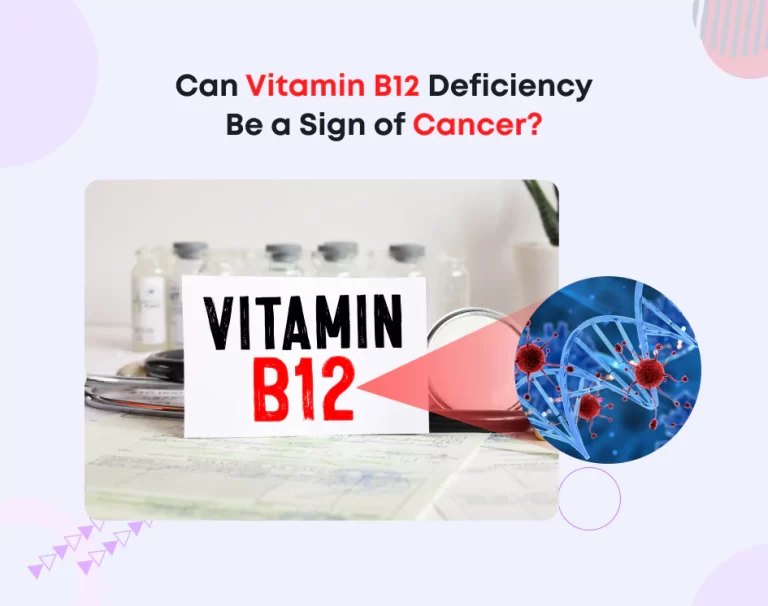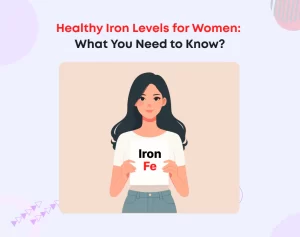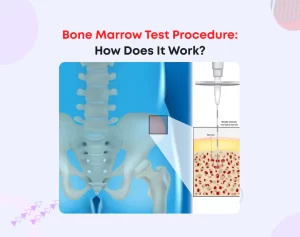
Can Vitamin B12 Deficiency Be a Sign of Cancer?
Vitamin B12, which is referred to as the energy vitamin, is very vital to our body; it helps in the health of nerves and blood cells. It is also required in the production of DNA, which is a genetic material that is present in all human cells. It is a cardinal nutrient that, when lacking in the body, causes a myriad of ailments that extend from fatigue to nerve disorders.
Lack of Vitamin B12 can be a symptom of something more dangerous, such as cancer at a very early stage. This question has raised quite a controversy as researchers look for the links between low levels of B12 and specific types of cancer. In this blog, we will therefore expound on the relationship between Vitamin B12 deficiency and cancer.
Vitamin B12 and Why Does it Matters?
Vitamin B12 is a B complex vitamin with properties best dissolved in water; it can be acquired mainly from animal foods. It plays an essential role in several vital functions, comprising:
- DNA Synthesis: This vitamin is vital for synthesising DNA and for repairing the same; it is indispensable where new cells are being produced.
- Red Blood Cell Formation: It assists in the synthesis of red blood cells, which are important in the transportation of oxygen in the body. A deficiency can lead to anemia, which has features of weakness and fatigue.
- Nerve Function: This vitamin is essential for the normal functioning of nerves apart from preserving the sheath of the nerve. Lack of B12 will cause a nerve problem to occur, and the individual will start to develop tingling, become numb, and start to lose balance.
Common Causes of Vitamin B12 Deficiency
Lack of Vitamin B12 is a condition that people rarely know much about, yet it is quite frequent in the elderly and people with certain dietary preferences. Here are some common causes:
- Malabsorption Issues: B12 absorptions are associated with disorders like celiac illness, Crohn’s illness, or perhaps an ageing digestive system.
- Medication Interference: Some drugs, such as metformin, used for the treatment of Diabetic patients, and Proton-pump inhibitors, which treat patients with Acid reflux, prevent B12 absorption.
- Dietary Insufficiency: It is almost absent from vegetable products, and thus, people following strictly vegetarian or vegan diets may suffer from its deficiency as this vitamin is accumulated in animal tissues like meat, eggs and dairy products.
Knowledge of these causes is important since it allows for the detection of those in a high-risk category and promotes early treatment.
The Relation between Vitamin B12 Deficiency and Cancer
In the past years, some researchers have claimed that Vitamin B12 deficiency could be associated with cancer. B12 deficiency does not directly lead to the development of cancer; however, it is suggestive of some problems.
Gastrointestinal Cancers
The link that can be drawn between Vitamin B12 deficiency and cancer is with gastrointestinal cancers – for example, stomach and pancreatic cancers. Here’s how:
- Pancreatic Cancer: This type of cancer affects some enzymes used in the digestion of food, particularly B12, causing deficiency.
- Stomach Cancer: As previously described, the stomach has an important function in B12 capture. Stomach cancer can destroy the cells that secrete intrinsic factors that are important for the absorption of B12; hence, a deficiency can occur.
However, it is critical to remember that anemia as a result of B12 deficiency may signal these cancers, but it is not conclusive in its simple presence. Nonetheless, if there are other symptoms, such as a change in weight without any reason, constant abdominal pain and change in bowel habits, then further examination is warranted.
Blood Cancers
Hypovitaminosis of B12 is often reported in patients with hematologic malignancy like leukemia or lymphoma. Here’s why:
- Bone Marrow Suppression: Some types of blood cancers can affect bone marrow production of red blood cells, thus resulting in decreased levels of B12.
- Anemia and Cancer: One of the consequences of blood cancers is anemia, and due to the fact that B12 deficiency is often manifested by anemia, people often confuse this disease with blood cancers. Blood cancers are diseases that impact the production of healthy blood cells, and thus, the B12 deficiency would be inclined to worsen this disease.
Other Health Conditions Linked to Vitamin B12 Deficiency
Although cancer is a prominent problem, this vitamin deficiency is associated with many other diseases. Here are a few other conditions where B12 levels play a significant role:
Neurological Disorders
There is a crucial role of vitamin B12 for advancement within nerves. A Vit B12 deficiency can result in neurological symptoms, such as:
- Mental Health Issues: Deficiency of B12 has also been found to cause depression, anxiety and fluctuating moods.
- Cognitive Impairment: Some of the consequences of deficiency include problems with memory and confusion, lack of coordination, problems with speech and even dementia.
If the B12 deficiency problem is taken care of as soon as possible, such diseases are not likely to develop further.
Cardiovascular Disease
When B12 levels are depleted, there is a tendency for homocysteine, which is correlated with heart disease, to rise. High homocysteine levels impair the function of blood vessels and raise the risk of a heart attack and a stroke.
Regular replenishment of B12 is good for the heart, compromising the risk factor for cardiovascular diseases.
How to Diagnose Vitamin B12 Deficiency?
If you think that you are low in Vitamin B12, getting medical attention would be beneficial. Diagnosing B12 deficiency typically involves:
Symptom Assessment: A doctor will examine your signs – including tiredness, weakness or shift in neurological function – to see if you’re suffering from a B12 deficits.
Medical History: Your health record will also be taken into consideration, which may consist of the diet you take, any medication you are on, or any other health complications that you might be having.
Blood Tests: The amount of Vitamin B12 in the blood can be consumed through a normal blood test. Doctors may also perform vitamin B12 homocysteine level tests or tests for methylmalonic acid (MMA), high levels of which suggest vitamin B12 deficiency.
If the condition is not treated early, long-term effects will occur on the body.
Treatment Options for Vitamin B12 Deficiency
If one is diagnosed with Vitamin B12 deficiency, several treatment methods can be taken depending on the cause and the advanced stage of the vitamin deficiency.
Dietary Changes
In case of a mild deficiency arising from a lack of the vitamin in their diet, patients should turn to foods high in B12. This includes:
- Animal Products: Animal products such as meat, fish, poultry, eggs, and dairy products are rich in B12.
- Fortified Foods: Plant milk and cereals are examples of vegetarian and vegan meals as they contain B12, which has been fortified.
It is beneficial to reintroduce these foods into your diet so as to enable the body to regain normal B12 levels.
Supplements and Injections
When a patient has more severe B12 deficiency or has it due to malabsorption, oral supplementation or injections may be required. These include:
- Oral Supplements: Pernicious anemia can be treated with over-the-counter B12 supplements, which work best for those with slight to moderate deficiency.
- Injections: For patients who cannot absorb B12 through digestion, oral supplements are ineffective. In such cases, doctors usually prescribe B12 injections, which are essential for rapidly correcting B12 deficiency.
It’s important to consult your physician regularly and have follow-up appointments to ensure the deficiency is properly managed.
Hence, you should consult your physician frequently and have follow-ups to make sure the deficiency is compensated well.
Prevention of Vitamin B12 Deficiency
Preventing a disease in the first instance rather than to treat the same later on could be a wise decision. Here are some tips to maintain healthy B12 levels:
- Balanced Diet: Make sure to consume foods that contain B12 or foods that have been fortified with the vitamin; these include animal products.
- Monitor Medications: If you are on medicines that hinder the absorption of B12, then consult your physician concerning your options or possible supplements that you can take.
- Regular Check-ups: People with the risk of B12 deficiency should, therefore, consider seeing their doctors more often with the intention of having the condition diagnosed at its early stages.
To achieve this, you might carry out the above steps to help prevent the deficiency and other complications that affect your body.
Summing Up
Lack of Vitamin B12 is a health complication that may have an association with cancer. Hence, although a deficiency or lack of these markers by itself can never be taken as proof of cancer, it should not be dismissed if it comes hand-in-hand with other alarming signs.
Health requirements such as visiting a doctor frequently, taking nutritional food, and treating the problems that result in deficiencies are some of the common measures for health maintenance. It goes a long way to help one practise early prevention when symptoms are first noticed or when such diseases are suspected. So, anyone who feels that they might be a victim of Vitamin B12 deficiency should not waste any time consulting with a healthcare professional and embracing the right measures that can safeguard one’s health.






